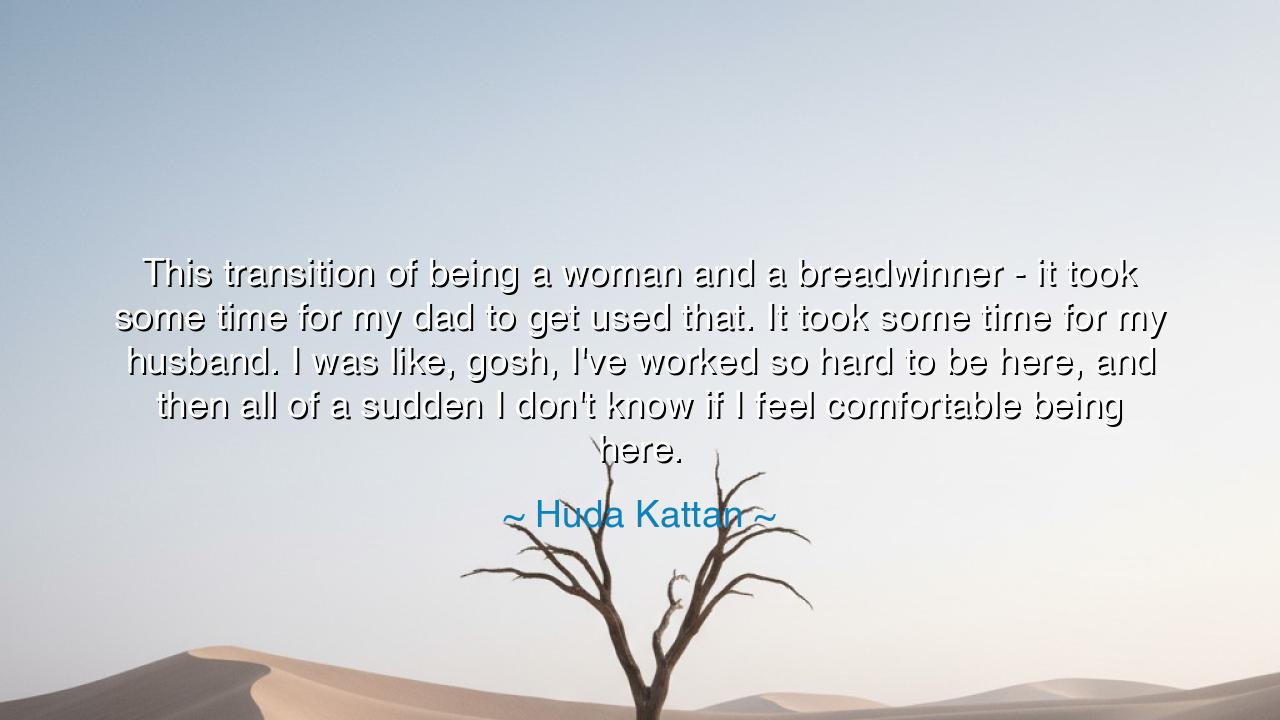
This transition of being a woman and a breadwinner - it took some
This transition of being a woman and a breadwinner - it took some time for my dad to get used that. It took some time for my husband. I was like, gosh, I've worked so hard to be here, and then all of a sudden I don't know if I feel comfortable being here.






In a moment of honest reflection, Huda Kattan, the visionary entrepreneur and founder of Huda Beauty, spoke these deeply human words: “This transition of being a woman and a breadwinner — it took some time for my dad to get used to that. It took some time for my husband. I was like, gosh, I’ve worked so hard to be here, and then all of a sudden I don’t know if I feel comfortable being here.” Though she speaks of her own life, her words echo a timeless struggle — the tension between achievement and acceptance, between the triumph of progress and the ancient weight of tradition. Beneath her gentle tone lies a profound truth: that change, even when it brings freedom, often asks the heart to confront centuries of expectation.
The origin of this quote lies in Kattan’s journey as one of the most successful self-made women in the beauty industry. Born to Iraqi parents and raised in America, she built an empire from her passion, transforming a humble makeup blog into a global brand. Yet, as her success grew, she found herself facing a challenge not of business, but of identity — the subtle unease of stepping into roles once denied to women. In her father’s eyes, and even in her husband’s, the concept of a woman as the breadwinner was new, unsettling, and at times difficult to reconcile with cultural tradition. But Kattan’s words do not condemn them; instead, they reveal the delicate process of evolution — for both men and women — in a world where old structures meet new realities.
Her statement captures a feeling that many women throughout history have known: the strange discomfort of breaking barriers. To “work so hard to be here” — to fight through doubt, to labor with vision and discipline — only to arrive and question one’s right to stand in that place of power, is the emotional inheritance of generations who were told their dreams were not meant for them. Kattan’s hesitation, her moment of self-questioning — “I don’t know if I feel comfortable being here” — reveals how deeply culture shapes the inner landscape. Even when the world begins to change, the echoes of the past still whisper: Are you sure you belong?
This struggle between tradition and transformation is not new. In every era, there have been those who stepped forward into forbidden roles, only to find the ground trembling beneath them. Consider Cleopatra, the queen of Egypt, who ruled as both monarch and strategist in a time when women were expected to adorn thrones, not command them. Or Marie Curie, whose brilliance illuminated the hidden laws of the universe, yet whose success was met with suspicion rather than celebration. Like Kattan, these women bore the dual burden of achievement and acceptance — they did not only have to succeed; they had to convince the world, and themselves, that their success was rightful.
Yet, through their courage, the world itself evolved. For every father who hesitated to see his daughter lead, there came a moment of pride. For every husband who struggled to share the mantle of provider, there came understanding. Such is the rhythm of change — uncomfortable, uncertain, but unstoppable. Kattan’s words show us that progress is not only an external act but an internal journey, one that asks both men and women to reimagine what it means to give, to support, to lead, and to love.
There is also a quiet humility in her reflection. Kattan, though a woman of immense success, does not speak with pride but with awareness — an acknowledgment that even empowerment carries emotional cost. To step into power is to navigate not just external obstacles, but the inner conditioning of generations. Her discomfort was not weakness, but wisdom: the understanding that identity is not remade overnight, that freedom must be claimed again and again, not just in the world, but in the soul.
The lesson, then, is clear and universal: true equality requires patience, empathy, and courage. It demands that women honor their achievements without apology, and that men learn to celebrate a woman’s success not as a threat, but as a shared victory of humanity. Families, too, must evolve — fathers must teach their daughters not only to dream, but to lead; husbands must learn that partnership means balance, not hierarchy. And each of us must confront the discomfort of progress, for it is through discomfort that we grow.
So remember, my children of the future: as Huda Kattan teaches, success is not only about reaching the summit, but learning to stand there without fear. When you break through a boundary, do not shrink from your own light. If the world struggles to adjust, do not let it shake your conviction. Be patient with those who must unlearn what time has taught them — for even the strongest traditions can bend toward understanding when guided by love. And when you find yourself wondering, “Do I belong here?” — let the answer be a resounding yes, for every step you take forward carries the footsteps of those who could not, and paves the path for those who will.






AAdministratorAdministrator
Welcome, honored guests. Please leave a comment, we will respond soon